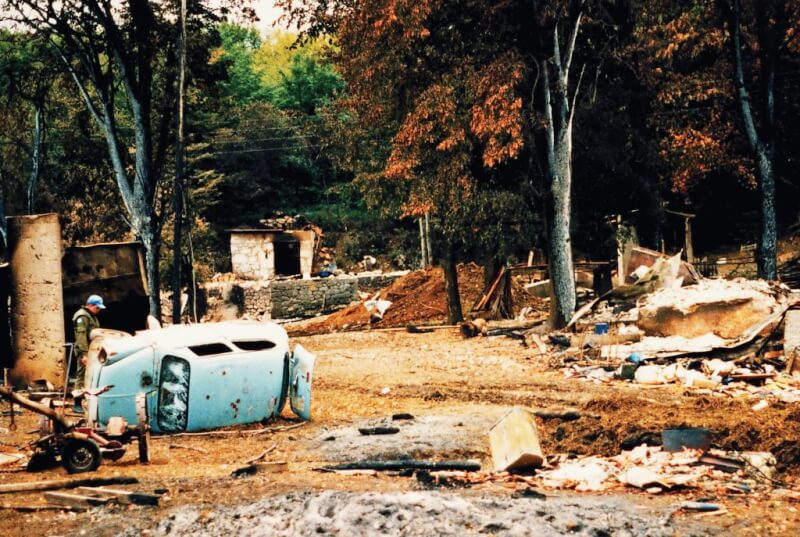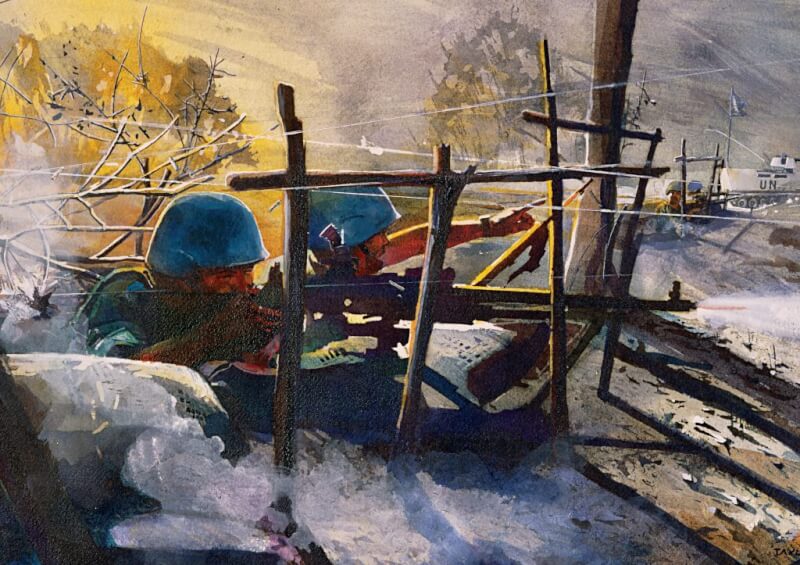
A UN soldier surveys the damage in the town of Medak after the battle in September 1993. Every house and hut was blown up and many of the ruins were left booby-trapped by Croatian troops.
[MASTER CORPORAL PHIL TOBICOE/PPCLI ARCHIVES/20.39.06]
But as the sounds of rifle fire mixed with the rising smoke from the villages beyond the roadblock, the Canadians imagined what this meant: the Croats were killing Serbs in the communities.
It was Sept. 16, 1993, and the hot midday sun beat down on Sergeant Sjirk Ruurds (Rudy) Bajema’s 2nd Battalion, Princess Patricia’s Canadian Light Infantry (2 PPCLI). During the Yugoslav Wars, a 1991-2001 conflict between the six former republics of Yugoslavia, the battalion had been tasked with securing Medak Pocket, a farming region off the Adriatic coast. Later known as Operation Medak Pocket, the mission was the most-significant combat Canadian forces had participated in since the Korean War. Its importance remains 30 years later.
“They would go out and exterminate entire families, shoot them in their homes and outside their homes and line them up,” Bajema said. “I’d seen a bit of it before that. But on that scale, [it] was unprecedented.”
2 PPCLI were left to wait, forced to listen to the sounds of death that would later transfix decades-long nightmares for some soldiers.
Following the death of Yugoslavian leader Josip Broz Tito in 1980 and the end of the Cold War, nationalist-separatist sentiment spread across the region, with each republic hungry for land and power. Wanting to establish stable conditions for peace talks during the breakup, the United Nations entered the fray in 1992, along with more than 14,000 Canadians.
During that time, the peacekeepers mediated a ceasefire between Croatia and its Serbian minority, establishing a buffer zone between the territories held by the two groups, including the Serbian-held Medak Pocket. But on Sept. 9, 2,500 Croat soldiers invaded the region. The next 12 hours were filled with artillery and mortar fire, with 2 PPCLI in the middle.
But just as quickly as the attack started, it stopped, the Croats finally agreeing to pull back to pre-Sept. 9 lines thanks to international pressure and 2 PPCLI Lieutenant-Colonel Jim Calvin’s mediation skills. The Canadians were ordered to move in, but when 2 PPCLI attempted to establish a crossing line on a main road between Medak and Gospic on Sept. 16, they were stopped by Croat forces.
The Croats fluttered from excuse to excuse—they were exploding old mines, preserving human life and property, maintaining proper battlefield sanitation—but Calvin grew restless as the ground shook from explosions; he soon demanded the Croats let the Canadians pass. Ready to play a “lethal game of chicken,” the two sides loaded their weapons and locked onto each other.
However, without any supporting tanks or artillery to stand up against the Croatian 9th Brigade, nor the UN mandate to do so, 2 PPCLI were left to wait, forced to listen to the sounds of death that would later transfix decades-long nightmares for some soldiers.
After an hour of waiting, Calvin realized that what he couldn’t breach with muscle, he could push with media. Armed with about two dozen reporters, the standoff was documented by the press, the journalists reporting on how Croatian forces were directly interfering with the UN agreement.
In what would be his “finest moment,” Calvin’s wager paid off, and an hour and a half after they were scheduled to move in, his company cleared the line. Thereafter, 2 PPCLI’s sweep team would painstakingly document the Croat-led ethnic cleansing on the Serbs.
Remarked Bajema: “I think the leadership [of 2 PPCLI] was pretty bang-on.”

“Firefight in the Medak Pocket” by Katherine Taylor depicts regular and reserve soldiers of 2nd Battalion, Princess Patricia’s Canadian Light Infantry, along with French troops, holding the line in a firefight against a larger Croatian force in September 1993.
[KATHERINE TAYLOR]
“I felt like government was abandoning us.”
Indeed, Calvin received the Meritorious Service Cross for, as his citation noted, carrying “out one of the most successful military operations in support of the humanitarian effort in this theatre.” For its efforts, 2 PPCLI received the UN Force Commander’s Commendation in 1993, one of only three such awards ever given to UN peacekeeping forces.
Upon returning to Canada, however, 2 PPCLI received a hushed homecoming, the Canadian government hesitant to show military support while tempering the media storm brought on by the Somalia affair, a 1993 scandal where Canadian paratroopers brutally tortured and killed a Somali teen while on a peacekeeping mission.
“It was a crappy time to be in the army,” noted Bajema.
Not only were 2 PPCLI members silenced, even when some showed significant operational stress injuries from their time in Medak, they were also shamed for their service, manifest by the Canadian government’s series of criminal investigations into leadership oversights and company discipline from the mission.
“I felt like government was abandoning us,” said Bajema, with most soldiers deeming the investigations “witch hunts.”
2 PPCLI was eventually redeemed—nine years later. Governor General Adrienne Clarkson awarded the battalion the Commander-in-Chief Unit Commendation in recognition of its “courageous and professional execution of duty during the Medak Pocket Operation.”
“I couldn’t be prouder of all the guys that went through all that,” said Bajema.
Advertisement


















